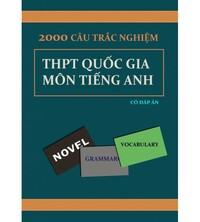Đề thi thử THPT Quốc gia 2018 môn tiếng Anh
Tìm Đáp Án xin gửi đến các bạn Đề thi thử THPT Quốc gia 2018 môn tiếng Anh trường THPT Tứ Kì, Hải Dương lần 1 có đáp án bao gồm các dạng bài phát âm, tìm lỗi sai, đọc hiểu...rất hữu ích giúp các bạn ôn tập và củng cố kiến thức ngữ pháp tiếng Anh, yên tâm bước vào kì thi THPT Quốc gia quan trọng sắp tới.
Mark the letter A, B, C or D on your answer sheet to indicate the sentence that is closest in meaning to each of the following questions.
Question 1. As soon as she approached the house, the policemen stopped him.
A. No sooner had he approached the house that the policemen stopped him.
B. Hardly he had approached the house that the policemen stopped him.
C. No sooner had he approached the when the policemen stopped him.
D. Hardly had he approached the house when the policemen stopped him.
Question 2. Sarah doesn’t like the new neighbor. Peter doesn’t like the new neighbor, either.
A. Either Sarah or Peter don’t like the new neighbor.
B. Both Sarah and Peter don’t like the new neighbor.
C. Neither Sarah nor Peter likes the new neighbor.
D. Either Sarah or Peter likes the new neighbor.
Question 3. “I will give you the answer by the end of the lesson.”. Tom said to Janet.
A. Tom offered to give Janet the answer by the end of the lesson.
B. Tom suggested giving Janet the answer by the end of the lesson.
C. Tom insisted on giving Janet the answer by the end of the lesson.
D. Tom primised to give Janet the answer by the end of the lesson.
Mark the letter A, B, C or D on your answer sheet to indicate the word(s) OPPOSITE in meaning to the underlined word(s) in each of the following questions.
Question 4. His rude comments made other Facebookers very angry.
| A. pleasant | B. honest | C. polite | D. kind |
Question 5. Fruit and vegetables grew in abundance on the island. The islanders even exported the surplus.
| A. small quantity | B. large quantity | C. excess | D. sufficiency |
Mark the letter A, B, C or D on your answer sheet to indicate the word(s) CLOSEST in meaning to the underlined word(s) in each of the following questions.
Question 6. GCSE are not compulsory, but they are the most common qualifications taken by students.
| A. required | B. applied | C. fulfilled | D. specialized |
Question 7. I received housing benefit when I was unemployed.
| A. out of order | B. out of fashion | C. out of work | D. out of practice |
Read the following passage and mark the letter A, B, C, or D on your answer sheet to indicate the correct answer to each of the questions.
Family life in the United States is changing. Thirty or forty years ago, the wife was called a "housewife". She cleaned, cooked, and cared for the children. The husband earned the money for the family. He was usually out working all day. He came home tired in the evening, so he did not do much housework. And he did not see the children very much, except on weekends.
These days, however, more and more wemen work outside the home. They cannot stay with the children all day. They, too, come home tired in the evening. They do not want to spend the evening cooking dinner and cleaning up. They do not have time to clean the house and do the laundry. So who is going to do the housework now? Who is going to take care of the children?
Many families solve the problem of housework by sharing it. In these families, the husband and wife agree to do different jobs around the house, or they take turns doing each job. For example, the husband always cooks dinner and the wife always does the laundry. Or the wife cooks dinner on some nights and the husband cooks dinner on other nights.
Then there is a question of the children. In the past, many families got help with child care from grandparents. Now families usually do not live near their relatives. The grandparents often are too far away to help in a regular way.
More often, parents have to pay for child care help. The help may be a babysister or a day-care center.
The problem with thjis kind of help is the high cost. It is possible only for couples with jobs that pay well.
Parents may get another kind of help from the companies they work for. Many companies now let people with children work part-time. That way, parents can spend more time with their children. Some husbands may even stop working for a while to stay with the children. For these men there is a new word: They are called "househusband". In the United States more and more men are becoming househusband every year.
These changes in the home mean changes in the family. Fathers can learn to understand their children better, and the children can get to know their fathers better. Husbands and wives may also find changes in their marriage. They, too, may have a better understanding of each other.
Question 8: These changes in the Amercan home may_____________
| A. not happen. | B. not change the children at all. |
| C. help families. | D. cause problems for a marriage. |
Question 9. It can be inferred from paragraph 4 that_____________.
A. couples with low-paid jobs can’t afford the cost of a babysitter or a day-care center.
B. in the past, grandparents did not help the couples with child care.
C. all couples with jobs can pay for help from a babysitter or a day-care center.
D. grandparents can help care the children in a regular way.
Question 10. Sixty years ago, most women____________.
| A. had no children. | B. were housewives. |
| C. went out to work. | D. did not do much housework. |
Question 11: Nowadays there are_____________.
A. more and more women staying with the children all day.
B. more work outside the home before.
C. more housewives than before.
D. more women going out to work than before.
Question 12. This article is about______________.
A. how more American women are working.
B. how family life in America is changing.
C. American men as house husbands.
D. housewives in America.
Question 13. The word “they” in paragraph 5 refers to__________.
A. children who spend more time with fathers than mothers.
B. husbands who stop working to stay with the children.
C. parents who workpart-time.
D. fathers who spend more time with their children.
Question 14. The word “laundry” in paragraph 2 is closest in meaning to ___________.
A. washing and ironing.
B. tidying up.
C. cooking and washing up.
D. shopping.
Mark the letter A, B, C, or D on your answer sheet to indicate the sentence that best combines each pair of sentences in the following questions.
Question 15. The student next to me kept chewing gum. That bothered me a lot.
A. The student next to me kept chewing gum, that bothered me a lot.
B. The student next to me kept chewing gum bothered me a lot.
C. The student next to me kept chewing gum, which bothered me a lot.
D. The student next to me kept chewing gum bothering me a lot.
Question 16. My father regrets taking up smoking. He can’t give it up now.
A. Regretful as my father is, there might be a chance for him to stop smoking.
B. My father can’t give up smoking now and feels regret about it.
C. My father regrets having taken up smoking because he’s not able to give it up now.
D. My father wishes he hadn’t taken up smoking since he can’t cut down it now.
Đáp án Đề thi thử THPT Quốc gia môn tiếng Anh năm 2018
| 1 | D | 11 | B | 21 | C | 31 | D | 41 | D |
| 2 | C | 12 | B | 22 | C | 32 | C | 42 | B |
| 3 | D | 13 | A | 23 | A | 33 | A | 43 | B |
| 4 | C | 14 | 24 | D | 34 | C | 44 | A | |
| 5 | A | 15 | C | 25 | A | 35 | B | 45 | B |
| 6 | A | 16 | C | 26 | D | 36 | A | 46 | C |
| 7 | C | 17 | A | 27 | B | 37 | C | 47 | A |
| 8 | C | 18 | B | 28 | C | 38 | D | 48 | B |
| 9 | A | 19 | A | 29 | D | 39 | B | 49 | B |
| 10 | B | 20 | C | 30 | A | 40 | A | 50 | A |
Đối với kì thi THPT Quốc gia thì luyện đề là một trong những hoạt động cần thiết và không thể bỏ qua để các bạn có thể tập dượt và đánh giá được khả năng của mình. Bên cạnh đó việc ôn luyện lý thuyết và bài tập theo mảng cụ thể, ví dụ như câu điều kiện, word form, trọng âm, trắc nghiệm ngữ pháp tiếng Anh, trắc nghiệm ..cũng rất hữu ích giúp các bạn đạt điểm cao trong kì thi quan trọng này.







